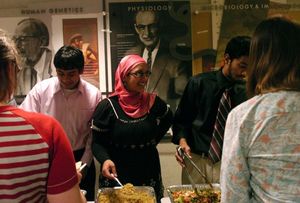University of Michigan medical school students, faculty fast for a day to better understand Muslim patients
They don't typically eat that early, but they wanted to get something in their stomachs before fasting for the Muslim observance of Ramadan.
"It's the only place that's open at 4 in the morning," Guh said.
She and many of her medical school friends aren't Muslim, but as future physicians, they were trying to better understand how annual Ramadan fasting would affect the lives of their Muslim patients.
They were among about 100 students and about a dozen faculty who participated in the Muslim Medical Students Association's Fast-A-Thon Wednesday. The event encourages members of the medical school community to try to adhere to the traditional fast from eating or drinking anything between dawn to dusk for one day of Ramadan. U-M was one of many campuses across the United States with similar events.
"In terms of understanding the science and the physical effects of fasting, that's something we can learn in lecture. Of course, we know what happens to a person's glucose levels when they don't eat for several hours," Guh said. "As a provider, this helps us understand better why it would be important enough for one of our patients to do this."
Ramadan is a Muslim holy month based on the lunar calendar during which followers fast from eating and drinking, as well as any excess indulgences, between sunrise and sunset.
The observance is meant to teach charity and patience, among other things, said Hasan Siddiqi, a leader of U-M's Muslim Medical Students Association. On Wednesday evening, they attended a reception to break the fast with Pakistani foods, and several speakers talked about the significance of the observance.
The idea behind the event is that if a provider can understand where a patient is coming from in their religious practices, they'll be able to find ways to accommodate those practices or better explain why they aren't medically safe, Siddiqi said.
The hope is to also build awareness and commonality between Muslims and non-Muslims in the medical community, he said.
Still dressed in his scrubs from his rotation in the surgery department Wednesday, Wajeeh Muhammad — who is Muslim — said he appreciated the effort many of his non-Muslim counterparts were making. It will benefit them in the future as physicians, he said.
"The first couple days of this are tough. The most difficult part is not drinking water. It is tiring," Muhammad said.
It's good for doctors to know how people experience the challenge differently and how they're ultimately trying to experience physical discomfort as a way to feel empathy and charity for those who go without, he said.
Matt Velkey, who teaches histology at the medical school, is a non-Muslim faculty member who participated in the fast. He was lecturing all day, so he allowed himself water.
Despite already understanding the effects, it heightened his awareness of the irritability and fatigue that accompanies fasting, he said. He also said he was glad to see so many of his students taking the time to experience it even though it isn't part of their personal faith.
Many first- and second-year med students are caught up in studying cells or tissues. He said the event forced them to pull back into thinking about their ultimate focus: Patients.
"As a physician, they'd have to decide the line between something that's medically safe and having religious awareness," Velkey said.
Photos by Melanie Maxwell, AnnArbor.com.
Tina Reed writes about health and the environment for AnnArbor.com. You can reach her at tinareed@annarbor.com or find her on Twitter @Treedinaa.

No comments:
Post a Comment